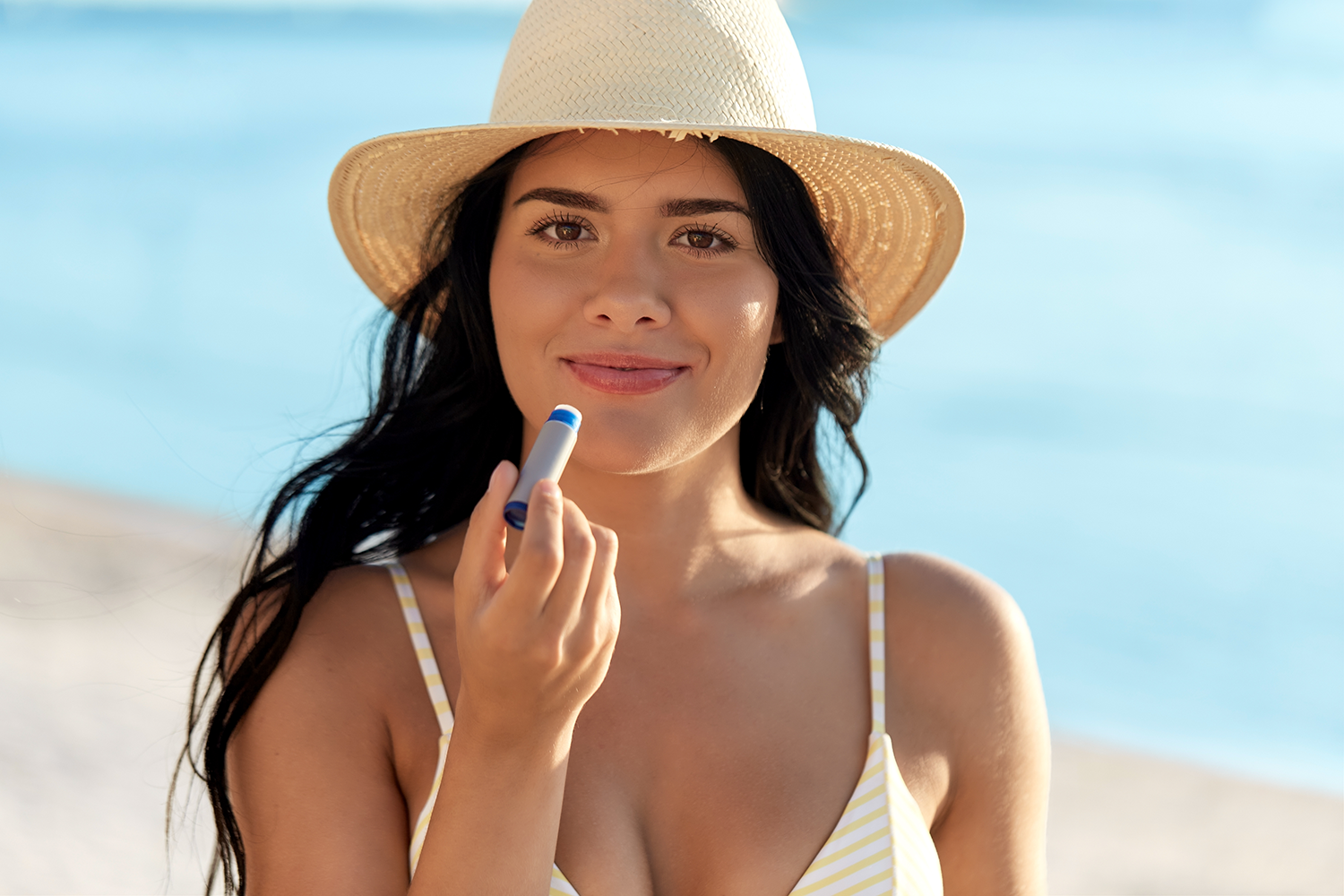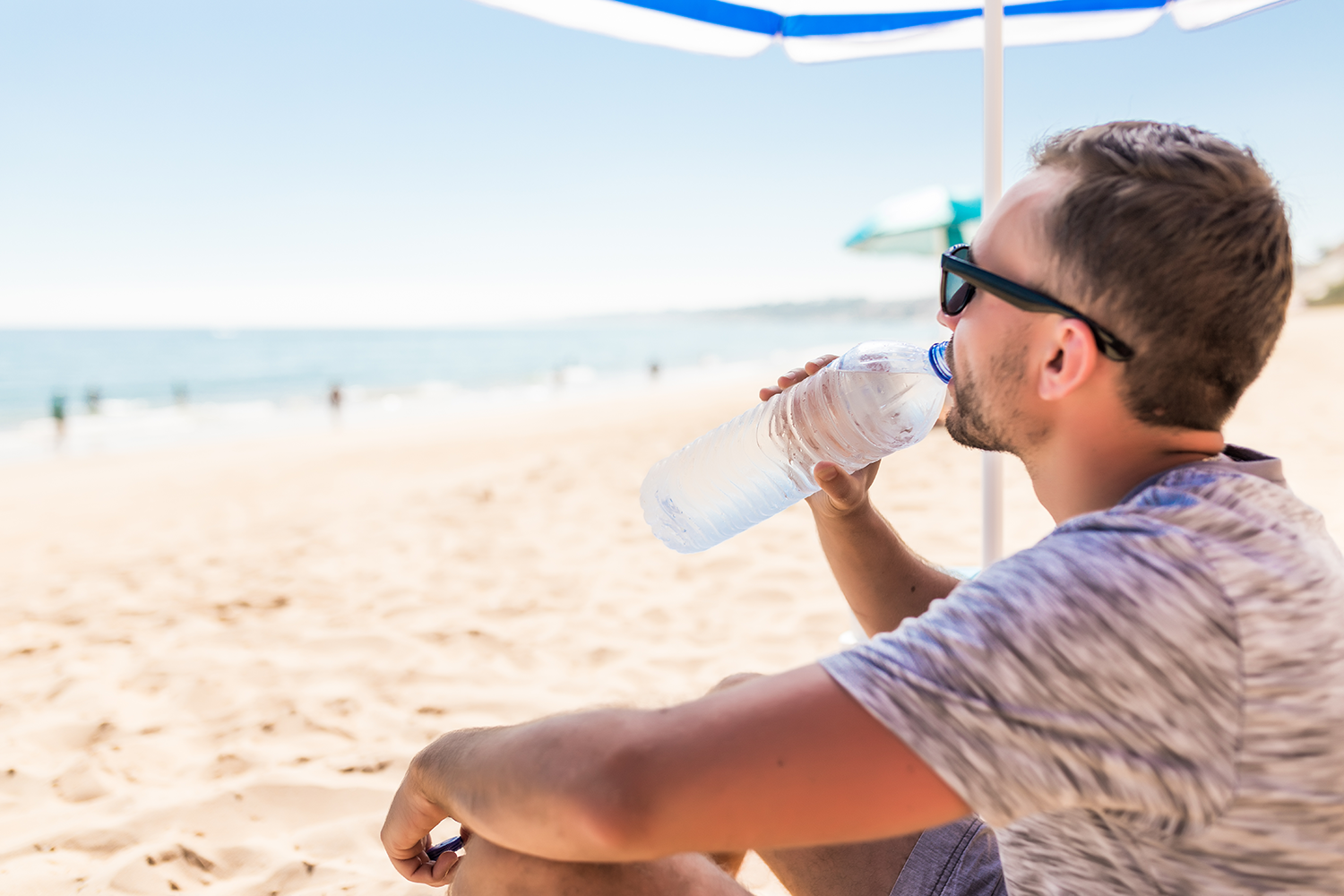Protecting your skin from the sun is essential to slowing down ageing. However, have you considered whether or not sun exposure may also cause damage to your lips, teeth, and gum?

Given that Australia has some of the highest UV levels in the world, applying sunscreen to your lips can be important in Australia. But how does the sun affect your mouth including teeth and gums and what can you do to enhance your oral health? Use this guide to understand how sun exposure affects your lips and mouth and learn a few easy ways to keep your overall oral health, healthy.
From our lips to our gums, and even our teeth, excessive sun exposure and ultraviolet (UV) rays can have a range of impacts, some of which might surprise you. Here’s a breakdown of how sun exposure affects each part of your mouth and why sun protection is crucial.
Sunburned Lips
Your lips are especially vulnerable to sun damage due to their thin skin. UVA rays break down collagen and speed up ageing, while UVB rays cause sunburn, chapping, and raise the risk of lip cancer. Extended exposure can lead to painful dryness, cracking, and long-term harm.
Dehydrated Lips
Spending time in the sun can quickly dehydrate your lips, resulting in dryness, peeling, and making them more prone to sores and irritation.
Crusty and Dry Spotted Lips
Known as actinic cheilitis or “farmer’s lip,” this condition is caused by prolonged sun exposure and leads to scaly, rough patches—especially on the lower lip. If left untreated, it can increase the risk of lip cancer.
Lip Cancer
Ultraviolet exposure significantly increases the risk of lip cancer, particularly on the lower lip. Protect your lips by using SPF 15 or higher lip balms and avoiding tanning beds.

Teeth Colour Change
When you're dehydrated, your body produces less saliva. This makes it easier for food particles and bacteria to build up on your teeth, leading to staining and discolouration.
Teeth Cavities
Saliva plays a key role in neutralising acids and washing away bacteria. With reduced saliva due to dehydration, harmful bacteria can thrive and release acids that wear down enamel—leading to yellowing, tooth sensitivity, and eventually cavities.
Increased Sensitivity of Whitened Teeth
Teeth whitening treatments that use UV or LED lights can temporarily make teeth more sensitive. Staying well-hydrated and avoiding sun exposure after treatment can help reduce discomfort and protect enamel.
Dry Gums
Exposure to UV rays can reduce moisture levels in the mouth, decreasing saliva flow. This dry environment encourages plaque buildup, raising the risk of gum diseases such as gingivitis and periodontitis.
Infected or Inflamed Gums
When the mouth lacks adequate saliva, gums can become inflamed or infected. Left untreated, this can lead to gum recession and even tooth loss over time.
Stay Hydrated
Water doesn’t just refresh you—it’s vital for oral health, especially in summer. Dehydration reduces saliva production, allowing bacteria to thrive. Saliva helps wash away food debris, balance pH, and protect against tooth decay and gum disease. Aim to drink 2–3 litres of water daily and consider sugar-free gum to stimulate saliva and keep your mouth moist.

SPF Lip Balm
Your lips are just as vulnerable to sun damage as the rest of your skin. Without protection, they’re prone to dryness, cracking, and conditions like actinic cheilitis. Use an SPF lip balm with at least SPF 15, and reapply regularly—especially after swimming or sweating—to keep lips healthy, hydrated, and protected from harmful UV rays.
Don’t Forget a Hat
A wide-brimmed hat is a simple yet powerful tool in protecting your lips and mouth from harmful UV rays. Use it alongside sunscreen, especially between 10 am and 4 pm when the sun is strongest. Physical barriers like hats, shade, and clothing are essential parts of your summer sun-protection routine.
Let me know if you'd like to add any tips on sunscreen, hydration-friendly foods, or more summer dental care advice!

While excessive sun can lead to sunburned lips and other oral health issues, moderate sun exposure can be beneficial. So, is sun exposure entirely bad for your mouth? Not necessarily! Sunshine is an important source of Vitamin D, which plays a big role in supporting oral health. Vitamin D helps keep our skin strong, supports healthy gum tissue, and may boost cell regeneration for the skin on your lips.Here’s the key: a balanced exposure of Vitamin D. Short periods of sun exposure, like 10-15 minutes a few times a week, are usually enough to help your body produce Vitamin D without risking too much UV damage. This way, you get the benefits of sunlight without exposing your lips and gums to excessive harm. Remember, a little sun is helpful, but too much can lead to the issues we’ve discussed.
Exposure to the scorching sun increases the risk of dry mouth, sunburnt lips, and even oral cancers, making it essential to stay proactive in protecting your oral health.To enhance your oral health, consider applying a lip balm with an SPF of at least 15, staying consistently hydrated, and wearing a wide-brimmed hat. These simple steps can go a long way in shielding your lips and mouth from the harmful effects of the sun.Want to start prioritising sun protection when it comes to your oral health? Schedule a general consultation here at Smile Place to receive individualised recommendations on ways to protect your lips and mouth from the sun.
How does Australia’s sun impact oral health?
Australia’s extreme UV levels can increase the risk of sunburned lips, dry mouth, and even oral cancer. To protect your oral health, it’s important to use SPF lip balm, stay hydrated, and seek shade during peak sun hours.
What are the best ways to prevent dry mouth in the heat?
Staying hydrated is key—drink plenty of water, especially when outdoors or exercising. Chewing sugar-free gum can also help by stimulating saliva production and preventing dry mouth.
How often should I reapply SPF lip balm?
Reapply every two hours, or more frequently if you’re swimming or sweating, to maintain effective sun protection for your lips.
Can dehydration affect my gums?
Yes, dehydration reduces saliva flow, which can increase bacteria in your mouth. This may lead to gum disease and bad breath.
Is it ever too late to protect my mouth from sun exposure?
It’s never too late. Applying SPF products, staying hydrated, and using sun protection measures will always benefit your oral health—no matter your age.
Need personalised advice?
Consult with Smile Place to learn more about protecting your oral health from the sun. We’re here to guide you on best practices and help keep your smile healthy all year round.